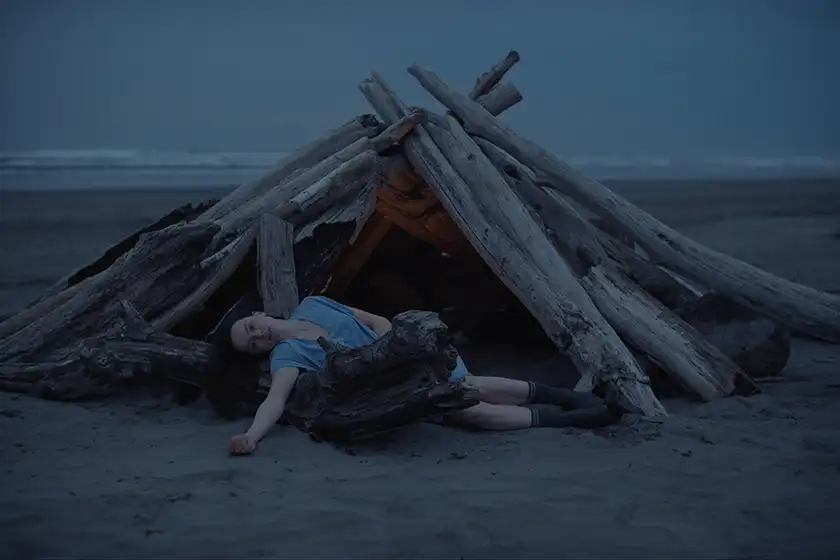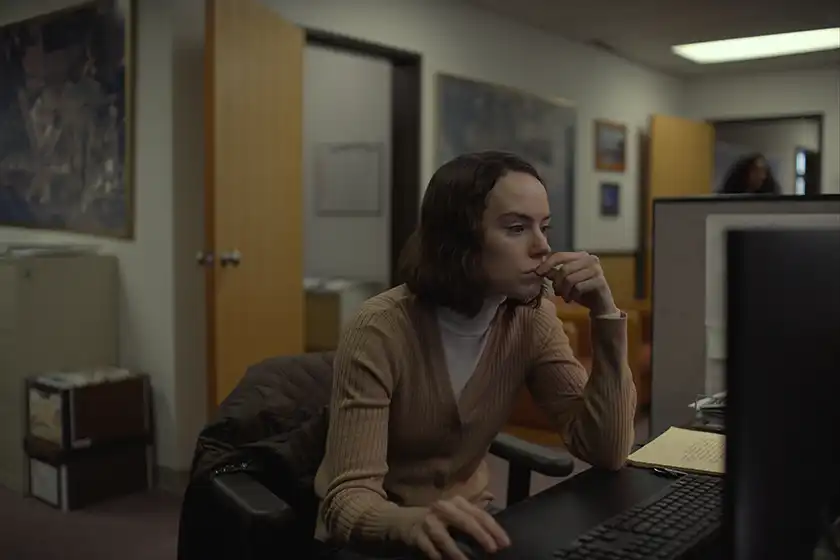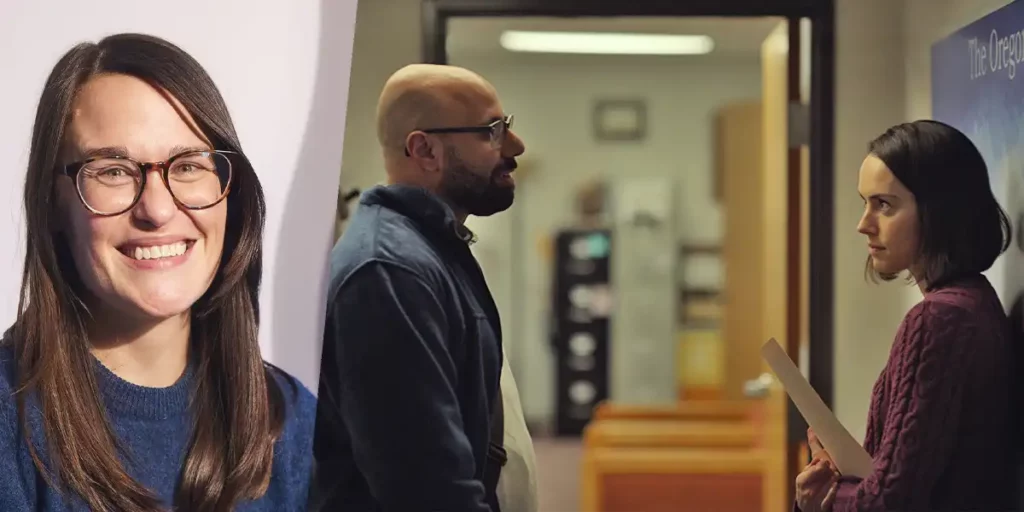We met with Sometimes I Think About Dying director Rachel Lambert and star Dave Merheje for an interview about the creation and inspiration behind their upcoming film.
Sometimes I Think About Dying is a new romantic drama/comedy directed by Rachel Lambert, based on Kevin Armento’s 2013 play, “Killers”. After premiering at last year’s Sundance Film Festival, the film is scheduled for release this month in the United States. Daisy Ridley plays Fran, a young woman with crippling social awkwardness who keeps to herself, lives out colorless days, and occasionally daydreams about her own death. But when a new coworker of hers, Robert (Dave Merheje), tries to befriend her, Fran slowly starts to emerge from her self-isolation, working with her anxieties to build a relationship with Robert and eventually her other coworkers.
Rachel Lambert is a filmmaker who lets her movies revel in the tinier details of every scene, and Sometimes I Think About Dying is a tenderly meditative film that plays very well into those strengths, visually and verbally contemplating life and its little moments. Daisy Ridley gives a subdued but magnetic performance that has you begging for her character to find some happiness in the opportunities in front of her, while Dave Merheje effectively takes charge as Robert, bringing him to life as the charismatic driving force of much of the story.
We were fortunate to talk with Rachel Lambert and Dave Merheje. In this interview, they elaborate further on what they brought to Sometimes I Think About Dying, the process of making the film, and its ultimate thesis.
WHAT RACHEL LAMBERT AND DAVE MERHEJE BROUGHT TO SOMETIMES I THINK ABOUT DYING
Even though Sometimes I Think About Dying is based on a play, there’s a very personalized touch to it. Rachel, how much of your execution of the material was driven by your own life experiences and thoughts?
Rachel Lambert: This was the first time I directed something where I didn’t write the feature script. So, I first came to it from a place of response, seeing it as an opportunity to touch on things that mattered to me and were resonant to me. I was also responding to certain opportunities as a filmmaker that the film presented when it came to the first-person narrative. The script had no visual data at all, so I had the invitation to think about what the death visions are, what they do, and how they work. Additionally, my sense of humor is certainly throughout the film, like in the portrayal of the office space.
There’s also one scene in the film that I was given permission by the writers to write myself. I wanted a scene that would bridge two sequences near the end, one that I felt was needed to understand what was motivating Fran to do what she does at that point. The preceding piece, while evocative and beautiful, was wordless, so I wanted to put a finer point on it, and I knew Fran couldn’t be the one to articulate it. She learns through watching and observing, so it had to come from someone else.
So, with the writers’ permission, I wrote a scene that’s like my thesis statement about what this material is discussing. I even used a line that was given to me by a friend many years ago that I hold on to all the time as a comfort and a guide: it’s so hard being a person. Everything that’s said there articulates what I think and feel about not only this film, but also life. The rest of how I directed the film or fostered in the ensemble are still me, but that scene was where I got to have myself included much more intentionally.

Dave, can you elaborate on any of his own life experiences that you channeled into your role?
Dave Merheje: When it comes to the idea of the title, Sometimes I Think About Dying … in the past, I’ve thought of dying, sure. But I think when you say it out loud, it weirds people out. As much as people say they’ll be there for you or are comfortable with your vulnerability, it is a scary thing to bring up. I felt I could find compassion with Fran’s character in that sense. There was a lot of stuff I saw in her that I could play off of. I’ve had real experiences of trying to get close to someone as a friend, but either I or they weren’t being vulnerable. I was scared and not letting someone in. So, I drew a lot from past relationships and actions that I’ve done in my life.
THE FILMING PROCESS OF SOMETIMES I THINK ABOUT DYING
Because Fran is a more passive, reactive character, how did it feel for you to be the driving force pushing most of his scenes forward, Dave?
Dave Merheje: I was scared and had impostor syndrome, but Rachel was by my side for the whole thing. Her advice, patience, and guidance as she let me play made me able to trust her. The crew also helped me get over that, including Daisy with her giving nature and comfort, as well as the rest of the actors. This was my first movie I’ve ever done, so it was scary to be in this position. But it all felt like I had my family with me, so it made me feel really safe.
A lot of the film early on is shot in deliberately dour lighting in the office. Did that affect on-set morale in any way? Or did anyone have any practices keep the energy upbeat?
D.M.: It was actually super fun. Everybody was jovial, riffing and joking around. Somehow in a week and a half, it felt like I had worked with these people for ten years. I even remember that when some of the actors left, it was sad. I was asking, “Why did this person go?” or when someone stayed longer, I was like, “Can he stay the rest of the time?” We were just having so much fun, just buzzing around and kind of being a little family.
We see a few of the death fantasies in Fran’s head. How were they put together, and did every idea make it into the film?
Rachel Lambert: Pretty much everything made it in. It’s such an intentional film, which is how I always work. We found a lot of those images through the process of being in Oregon together as a team, allowing the setting, experience, pre-shooting days with cinematographer Dustin Lane, and Daisy’s work as Fran to inform what we would sculpt. I’m a planner, so my instinct at first was to predict all of this stuff at the script level and sit down with writer Kevin Armento to figure that out. But it started to become clear to me that I’d then be possibly grafting onto the space and to the reality that we were going to build something I might have made up months before.
So instead, I did something that I don’t normally do, which was apprehending the desire to totally control and predict everything, and trying to be more willing to trust that we’d find something and be informed closer to the time we’d be shooting. And then it was me and Dustin collaborating, building these images based on what we were getting from all the artists and space around us, and then bringing them to life. It was an incredibly collaborative, alive series of choices that were very deliberate, and all of those compositions made it into the film.

RACHEL LAMBERT’S THESIS IN SOMETIMES I THINK ABOUT DYING
A monologue towards the end refers to little moments in life. With the pacing and detail in this film, was the goal to have viewers pick up on just how valuable those small things are?
Rachel Lambert: Exactly. That’s the monologue I was referring to previously that I was allowed to write, and it encapsulates, for me, everything that I wanted to say with the film: not taking for granted the things we might brush off as minutia or banal but, in fact, fill our day. We might brush off the things that we handle and touch and the people we see, but there’s so much magnitude in the miniscule. And I think when we afford magnitude to them, and when we recognize and acknowledge that, suddenly our days are incredibly full instead of feeling empty. They’re things like a character in the film being with her loved one on a lazy Sunday. When those things threaten to not be available to her now, she realizes they’re the most beautiful elements of her life. Now it takes on the sort of grandeur of what the soundtrack is then giving us, which is romantic and sweet and grandiose. So yeah, that to me is the thesis statement of the film.
The title is Sometimes I Think About Dying … what is dying? It’s the end of our time here. And so, when we’re thinking about it, we’re thinking about our time. We’re asking, “How much do I have left? What am I doing with that time? Am I using that time well? Am I enjoying that time? Is it meaningful?” And I think that’s where a lot of worry comes from, and an urge to escape. I think it comes from fear that we’re not using our time well, and there’s an apprehension and anxiety about that. The title is sort of a misnomer, because the movie is really investigating living, and how we’re living.
This interview was edited for length and clarity.
Sometimes I Think About Dying will open in theaters in NY (Angelika) & LA (The Grove) on January 26, 2024 with a national rollout to follow. The film will be released in UK cinemas from April 19. Read our review of Sometimes I Think About Dying!

